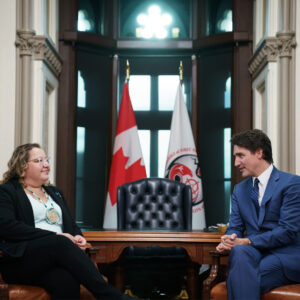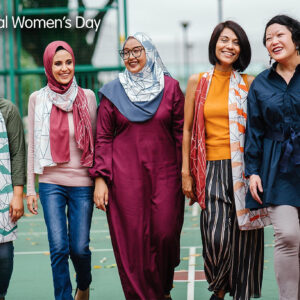
The community of Kahnawake has increasingly been in the news due to a conflict over a 1981 Band Council policy banning couples in mixed marriages from living on the reserve. The Two Row Times recently spoke with Cheryl Diabo, also known as Kahawinóntie, who is of the Bear clan of the Kanienkehaka Nation. Although Kahawinóntie was born and raised in Kahnawake, her name appears on an “eviction” list of people in the community having non-native partners that has been put together by a group in Kahnawake advocating for their eviction from the community due to their violation of the 1981 policy.
Can you give us an idea of why your name is on the eviction list?
I really can’t speak on their behalf, but I do know there is this misunderstanding of who my partner is and a lot of people are assuming that he has no native ancestry. Because of that I was put on the list.
So this is occurring because of a dispute as to what makes someone Mohawk or Kanienkehaka?
According to the eviction group, they are looking out for the best interests of the community, as Kanienkehaka of Kanawake. This is because they feel there is very little land and they don’t want to share it with anyone who is not of Kanienkehaka ancestry. They are getting a lot of support from the band council, so they have a lot of confidence allowing them to move forward with the eviction process.
What do you say to those community members who say that there is a well-known rule that if you marry someone who is non-native you cannot live on the reserve?
Well, this well-known rule was established in 1981, through band council, because a lot of people in the past were aware that there were evictions. So band council developed a moratorium stating that non-native people are not permitted to reside in the territory of Kanawake. But it’s not consistent with who we are as a Kanienkehaka nation. They claim to be representing our best interests, but our nation has that status as a nation because of our own constitution, the Great Peace, which is inclusive. I think that this 1981 moratorium is not consistent with the Great Law of Peace. I think it is very representative of the Indian Act system of blood quantum mentality, and it’s causing a division within the community and always has been there since the band councils were established in our territory.
Could you explain how in your understanding the Great Peace applies to questions around citizenship, children, and territory?
I was raised in the longhouse, I was named in the longhouse and I continue my connection with the longhouse because of what I learned in the longhouse about the Great Law. The reason for that is I believe everything I learned from the Great Law teaches fairness, inclusion, justice, peace, strength, righteousness and all of the things that are conducive to having a well-managed society and environment. Over time it is gradually being undone because of the mentality that was instilled in us through residential schools, the Indian Act, the Band Council systems, etc.
How has this whole ordeal affected your family and yourself?
Some of the main organizers have disrespected me on Facebook, even though we have never had the opportunity to speak in person. If they had known me prior to this issue, they would know that I’ve always involved myself whatever way I can on any level, that I offer my support to advocate for the Great Law of Peace to help keep it alive in our people, and I truly believe that without it we lose our identity.
Because I’m on this list doesn’t mean this is the only issue I’m concerned about, I’m also concerned about honouring our ancestors who worked to establish the rights we have today, and also for the present generations to remember everything that was laid out for us and to bring that on to the future generations. That’s what I work with in my home and my family, and I try to bring that out through my clan and affect the rest of the longhouse. There’s very [few] people who truly look to the Great Law for guidance, and when I find those people it’s important to work with them. To the people who don’t understand the Great Law, I don’t put any blame on them or have an animosity towards them. I hope we can come together and remember that we are a nation. I hope we can resolve our issues peacefully.
Can you speak about the lawsuit people are doing?
I chose not to file a lawsuit. From what I know there are seven people who have filed against band council. I chose to go a different route and try to work more cooperatively with the people as a whole. There are peaceful alternatives to breaking up families in Kanawake. I have worked to establish a group called Skahwatsí:rat (One Family) that is developing peaceful alternatives like residency permit options and disclaimers. We are involved in a process and maintain our connections with the community to understand all different aspects so that we can come together and work things out.
The people who are suing have been experiencing a lot of threats, vandalism, hate mail, just a lot of negative energy directed towards the people who are on the list, or who are family to those on the list. A lot of people have expressed that they don’t feel safe; they are worried about their children being bullied at the schools in the area. Perhaps parents are not censoring themselves around their children and that could influence their children. The seven people who are suing just want to resolve it as quick as possible. We can’t tell anybody what to do, and we can’t make anybody feel safe.
Any final thoughts?
I would say keep in mind that there are children and women involved in many cases. Many of these women and children have clans, and it’s important to remember what provides us with our identity is our birthright, when we are born into our clans. That entitles us to our responsibilities and our roles and to our rights. Remember that the women manage our families, our environment, our land. A fair and just society would look at how to make sure that the children are looked after cared for and protected. It is important to respect the women in order to have a healthy, functioning society and nation on its own. I think women were always looked to and revered because of what their roles are, and today that respect has been lost and really forgotten (even within women themselves) because of the conditioning and the assimilation process. We need to truly exercise our role as women and everyone needs to be encouraged to make informed decisions.







